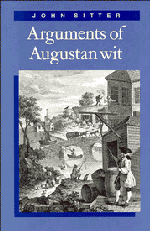Book contents
5 - That satire is art, only more so
Published online by Cambridge University Press: 28 January 2010
Summary
Critical evasions
Although the question “Is Satire Art?” may be considered officially dead, its assumptions have transmigrated to modern versions of the desire to protect literature from politics and rhetoric. It is probably more accurate to speak of a protective desire rather than a position, because actual arguments for a clear distinction between “literary” and “non-literary” writing have become increasingly rare. In relation to this question as to many others, ours is the Age of Quotation Marks. At the same time, we continue to feel the attractions of such an opposition, which can be traced back through at least one strain of Modernism to at least one strain of Romanticism and to the fitful invocations of “pure poetry” clustering in the 1740s. We might consider, for example, the lingering appeal of Yeats's claim that “We make out of the quarrel with others, rhetoric, but of the quarrel with ourselves, poetry.” Or the allure of the distinction drawn by Stephen Dedalus between the “static” emotion of proper art and the “kinetic” modes of didacticism or pornography, on the grounds that the latter make us want to do something. Or the elegiac economy of Frost's remark that politics is about “grievances,” poetry about “griefs.” Or Northrop Frye's characterization of a literary work as an “autonomous verbal structure” and non-literary writing as “words used instru- mentally.” Underlying each of these declarations are Romantic projections of the autonomy of the imaginative “self” and of the autonomy of “imaginative” literature.
- Type
- Chapter
- Information
- Arguments of Augustan Wit , pp. 155 - 174Publisher: Cambridge University PressPrint publication year: 1991



